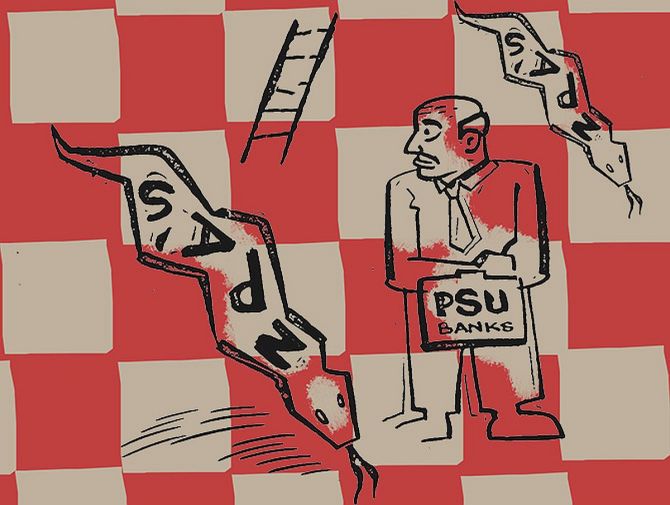Reports suggest state-owned banks have lapped up Rs 40,000 crore, so far, using both bonds and equity instruments. The question, though, is whether there will be a perceptional change for PSB stocks.

When Canara Bank announced its qualified institutional placement (QIP) at Rs 103.5 apiece last fortnight, critics questioned if a public sector bank can go to the market by itself.
After all, direct market equity sourcing has just been aspirational for a long time and turning to the government for recapitalisation is an easier option for PSBs.
But Canara Bank’s successful fundraising has made heads turn.
From Rs 94 a share a month ago to a little of Rs 125 now, the stock has surprised investors.
It’s also a good sign as Punjab National Bank is preparing to raise Rs 7,000 crore; there is roughly another Rs 14,000 crore of fundraising by PSBs in the pipeline.
Reports suggest state-owned banks have lapped up Rs 40,000 crore, so far, using both bonds and equity instruments.
“There is so much money in the market that irrespective of valuations, money is chasing all stocks,” says Siddharth Purohit of SMC Capital.
The question, though, is whether there will be a perceptional change for PSB stocks.
As Purohit puts it, banks which demonstrate their capabilities to raise capital in this round will see a valuation boost, making it easier for them to go to the market next time.
For another, priced at 0.3–0.5x FY21 book, Sridhar Sivaram, investment director, Enam Holdings, feels these are deep-discount stocks.
“Investors should look at them purely from a deep-value stocks perspective and not as growth stocks,” he explains.
Some fundamental improvements in the performance of PSBs over the past years also support his rationale.
The provision coverage ratio upwards of 75 per cent for most PSBs indicates that much of the legacy issues are adequately taken care of.
With large accounts -- such as Bhushan Power and Dewan Housing Finance -- nearing the final stages of resolution, earnings upside may be on the cards.
However, banks may likely utilise these loan writebacks to shore up provision coverage against the pandemic-induced asset quality disturbance.
What also shields PSBs is that in the last four years, they have been extremely cagey over big-ticket lending and increasing their exposure to the infrastructure segment.
This, by default, has tilted their loan books in favour of granular retail loans.
While there is growing unease in the retail segment, the good part is that PSBs have set their focus on secured loans -- mainly home and vehicle loans, whereas for private lenders unsecured portfolios remain the growth drivers.
Faster transmission of falling interest rates may have also placed PSBs attractively from a customer perspective, especially on the retail loan enquiries front.
Ashish Singhal, managing director, Experian Credit Information Company of India, says: “Loan enquiries for PSBs are above pre-Covid levels, while that of private banks is just about catching up.”
Nonetheless, PSBs may not lead the system on the overall growth front.
Purohit expects 7–8 per cent loan growth for state-owned banks, while Sridhar is a bit more optimistic at 10 per cent.
There is also the issue that credit underwriting practices have a long way to catch up in comparison with their private players.
“Structurally, nothing may have changed,” says Sridhar, though he believes with FY21 likely to be another year of elevated provisioning costs, normalisation could be on the cards next financial year.
From the current credit cost estimates of 2-2.5 per cent, PSBs are confident that the number will come down to 1–1.5 per cent in FY22.
So, how should investors approach PSBs?
“After every major rally in PSB stocks, it seems as though they are poised for better days and then reality sets in,” explains Purohit.
While this time downside risk to their balance sheets appears capped, he affirms PSBs stocks are best suited for institutional investors.
Retail investors should wait to see the normalisation play out before turning positive on these stocks, even at the cost of missing out on the rally.
Uncertainties around the behaviour of moratorium book and the outcome of the Supreme Court’s verdict on the interest waiver case, apart from the ongoing merger integration processes, are also overhangs.
“While PSB stocks aren’t structural stories, time will tell if they are mispriced stocks or a value trap,” says Sridhar.
Therefore, while the outlook is incrementally positive, PSB stocks are for those with a higher appetite for risk.











